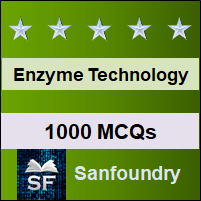
Enzyme Technology Multiple Choice Questions Highlights
- 1000+ Multiple Choice Questions & Answers (MCQs) in Enzyme Technology with a detailed explanation of every question.- These MCQs cover theoretical concepts, true-false(T/F) statements, fill-in-the-blanks and match the following style statements.
- These MCQs also cover numericals as well as diagram oriented MCQs.
- These MCQs are organized chapterwise and each Chapter is futher organized topicwise.
- Every MCQ set focuses on a specific topic of a given Chapter in Enzyme Technology Subject.
Who should Practice Enzyme Technology MCQs?
– Students who are preparing for college tests and exams such as mid-term tests and semester tests on Enzyme Technology.- Students who are preparing for Online/Offline Tests/Contests in Enzyme Technology.
– Students who wish to sharpen their knowledge of Enzyme Technology Subject.
- Anyone preparing for Aptitude test in Enzyme Technology.
- Anyone preparing for interviews (campus/off-campus interviews, walk-in interview and company interviews).
- Anyone preparing for entrance examinations and other competitive examinations.
- All - Experienced, Freshers and College / School Students.
Enzyme Technology Chapters
Here's the list of chapters on the "Enzyme Technology" subject covering 100+ topics. You can practice the MCQs chapter by chapter starting from the 1st chapter or you can jump to any chapter of your choice.- Enzyme Kinetics Fundamentals
- Enzyme Extraction and Isolation
- Enzymes Purification
- Enzyme Kinetics
- Immobilized Enzymes Preparation and Kinetics
- Large Scale Use of Enzyme in Solution
- Immobilized Enzymes and their Uses
- Biosensors
- Recent Advances in Enzyme Technology
- Enzyme Technology Future Prospects
- Enzyme Preparation and Usage
- Enzymes
- Enzyme Extraction and Purification
- Enzyme Assay & Enzyme Catalysis
- Clinical Enzymology
1. Enzyme Kinetics Fundamentals
The section contains multiple choice questions and answers on enzyme basics, enzyme nomenclature, enzyme inhibition, enzyme catalysis ph effect, temperature and ionic strength.
|
|
|
2. Enzyme Extraction and Isolation
The section contains questions and answers on enzyme sources, enzymes isolation, enzymes extraction using chemical and physical methods.
|
|
|
3. Enzymes Purification
The section contains MCQs on organic solvent and ammonium sulphate fractionation, dialysis, ultrafiltration, gel filtration, thin layer chromatography, ion exchange chromatography, affinity chromatography, high performance and fast protein liquid chromatography.
4. Enzyme Kinetics
The section contains multiple choice questions and answers on enzyme action mechanism and enzyme catalysed reaction kinetics.
|
|
|
5. Immobilized Enzymes Preparation and Kinetics
The section contains questions and answers on immobilization methods and immobilized enzymes kinetics.
|
|
|
6. Large Scale Use of Enzyme in Solution
The section contains MCQs on enzymes application in detergent industry, protease application in food, leather and wool industries, glucose and maltose syrups production, lactases application in starch industry, enzymes medical application, enzymes in fruit juice, wine, brewing and distilling industry.
7. Immobilized Enzymes and their Uses
The section contains multiple choice questions and answers on enzyme reactors, immobilized enzyme processes, high fructose corn syrups, acrylamide preparation, amino acids and antibiotics production.
8. Biosensors
The section contains questions and answers on biosensors like calorimetric biosensors, potentiometric biosensors, amperometric biosensors, optical and piezoelectric biosensors, immunosensors and biosensors applications.
9. Recent Advances in Enzyme Technology
The section contains MCQs on enzymes reaction and stabilization in biphasic liquid and aqueous-organic systems, aqueous 2 phase systems uses, in reverse enzymes practical examples, glucosidases used in synthetic reaction and lipids interesterification.
10. Enzyme Technology Future Prospects
The section contains multiple choice questions and answers on unnatural substrates, enzyme engineering, artificial enzymes and coenzyme regenerating systems.
|
|
|
11. Enzyme Preparation and Usage
The section contains questions and answers on enzymes sources, enzymes preparation from clarified solution, enzymes safety and regulatory aspects.
|
|
|
12. Enzymes
The section contains MCQs on proenzyme and cofactors, enzyme action specificity, allosteric enzyme, isoenzyme, enzymes diagnostic uses, enzymes therapeutic and analytical uses.
|
|
|
13. Enzyme Extraction and Purification
The section contains multiple choice questions and answers on enzymes molecular weight determination.
|
|
14. Enzyme Assay & Enzyme Catalysis
The section contains questions and answers on assays factors, continuous, discontinuous and coupled assay, enzyme assay techniques, and enzyme catalysis mechanism.
|
|
|
15. Clinical Enzymology
The section contains MCQs on clinical significance of amylase, transaminase, proteinases, trypsinogen, creatine kinase, nucleotidase, acetylcholine esterase and glucose-6-phosphate dehydrogenase.
Wish you the best in your endeavor to learn and master Enzyme Technology!
